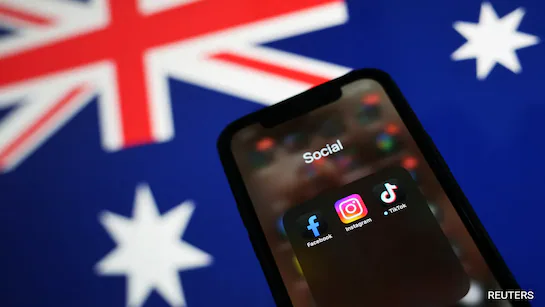Australia has made a historic move by passing a law that bans children under 16 from using social media platforms, marking a world-first legal approach. The legislation was approved by the Australian Senate on Thursday, with 34 votes in favor and 19 against. Earlier, the House of Representatives passed the bill overwhelmingly with 102 votes for and 13 against. On Friday, the House endorsed amendments made in the Senate, finalizing the law.
The law imposes fines of up to $33 million (A$50 million) on social media platforms like TikTok, Facebook, Instagram, Reddit, X, and Snapchat if they fail to prevent children under 16 from having accounts. Prime Minister Anthony Albanese emphasized that the law addresses concerns from parents about online dangers, stating that platforms now have a “social responsibility” to protect children.
Platforms will have a year to figure out how to enforce the ban before penalties are imposed. Meta, which owns Facebook and Instagram, criticized the legislation as being rushed, while industry group Digital Industry Group Inc. (DIGI) expressed concerns about the law’s practical implementation. DIGI’s managing director, Sunita Bose, pointed out that the rapid passage of the bill left many questions about its impact and technical requirements.
The law’s amendments also enhance privacy protections. Platforms cannot force users to provide government-issued IDs or use a government system for digital identification. However, critics argue that the ban could lead to privacy issues for users who need to verify they are older than 16.
While most major political parties support the ban, there are concerns from child welfare and mental health advocates. Senator David Shoebridge from the Greens warned that the ban could isolate vulnerable children, particularly in regional areas or those in the LGBTQI community who use social media for support. However, certain services like YouTube, Messenger Kids, WhatsApp, Kids Helpline, and Google Classroom will be exempt from the law.
Senator Maria Kovacic, from the opposition, argued that the law was necessary, emphasizing that social media platforms should have taken steps to protect children long ago. Online safety advocate Sonya Ryan, whose daughter Carly was tragically killed by an online predator, hailed the law’s passage as a critical step for protecting children. Similarly, Wayne Holdsworth, whose son Mac died from an online sextortion scam, expressed pride in the law’s approval.
However, Christopher Stone, the executive director of Suicide Prevention Australia, criticized the law, stating that it overlooks the positive role social media can play in supporting young people’s mental health. Stone expressed concern that the government had rushed the legislation without adequate evidence or consideration of its long-term effects.
Meta and Snapchat have expressed concerns about the law, with Meta noting that it was rushed through Parliament without proper consideration of existing industry practices or young people’s perspectives. Snapchat pledged to cooperate with the government during the 12-month implementation period to develop a balanced approach.
Critics argue that the law may be a political move ahead of the 2025 general election, designed to appeal to concerned parents. However, some warn that the ban could isolate children, limit their access to the positive aspects of social media, and potentially drive them toward less regulated parts of the internet. Others fear that it undermines parental authority and could inadvertently harm young people. Despite these concerns, the law marks a significant step in the global conversation on children’s online safety.


